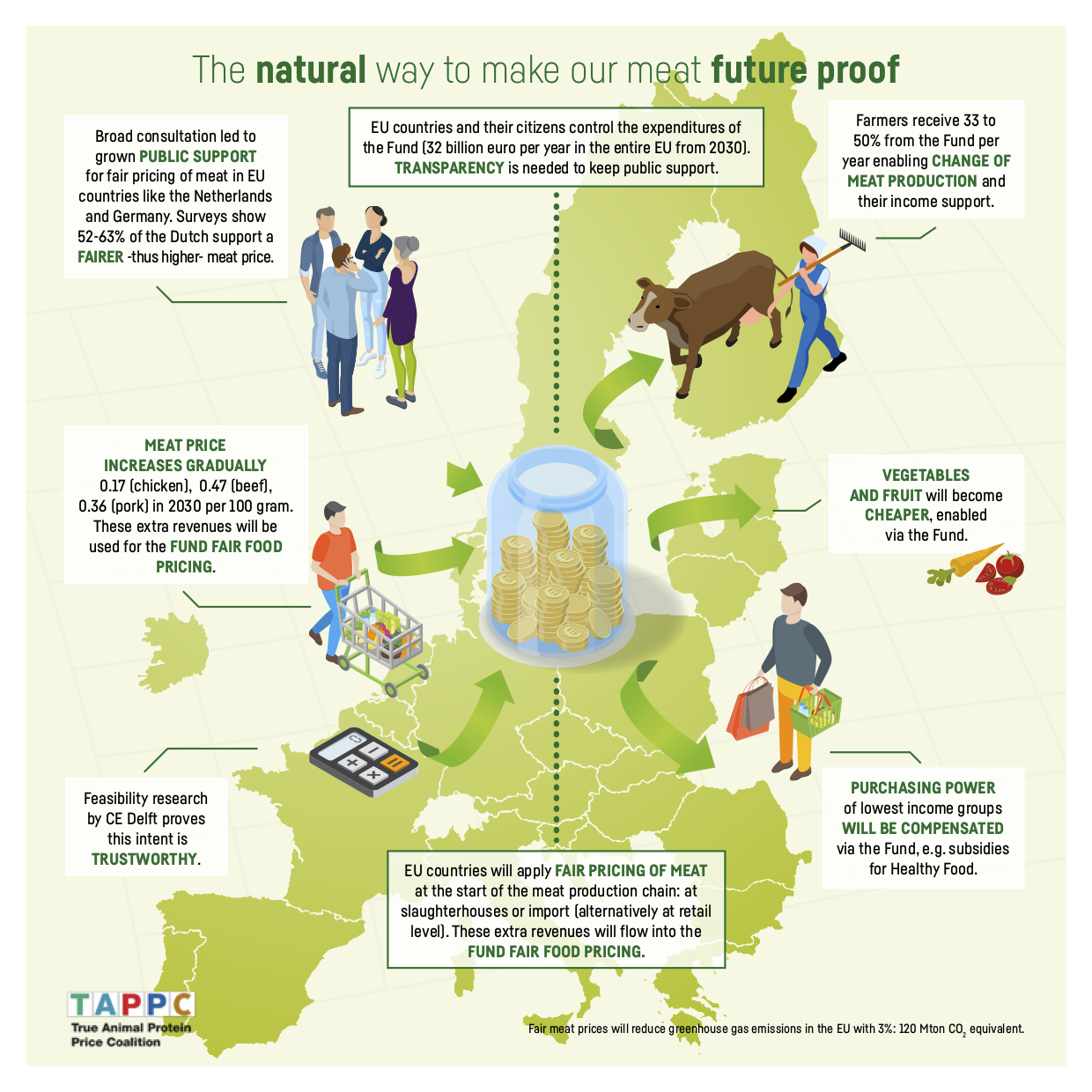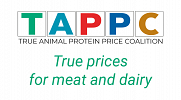True Pricing of food
Tapp Coalition published a report about the true price of meat, 5th February 2020 in the European Parliament:
Aligning food pricing policies with the European Green Deal
Summary; https://canvas.disabroad.org/courses/4391/pages/the-tapp-coalitions-proposal-for-an-eu-meat-tax
This report is based on a report of CE Delft consultancy, commissioned by Tapp Coalition:
https://cedelft.eu/publications/a-sustainability-charge-on-meat/
Food prices do not reflect all costs relating to the production of consumption, like environmental costs, health and other costs. In addition, farmers often receive too low payments for a fair income. According to a FAO report in 2015, environmental external effects cost 2300 billion USD/year, more than double the market value of global food.
Many stakeholders, including governments, companies, universities and ngo's are involved in 'true pricing' initiatives to have a common understanding of methods to calculate the 'true price' of food. They do this with the aim to make sure external costs (like costs related to greenhouse gasses or biodiversity loss) are reduced and included in consumer prices, eg. by fiscal policies by governments or price policies of supermarkets or food companies. In addition, farmers have to be paid fair prices too, including all costs they make and payments for a fair living.
The TAPP Coalition has a focus on animal products like meat, dairy, eggs and fish. We started with developing studies to calculate a true price for beef, veal, pork and chicken meat in the Netherlands and the European Union in 2019. We translated this calculations to fiscal policies, to make sure consumers pay the 'true price' of meat products, including the price of greenhouse gasses, air pollution and biodiversity loss. For CO2 equivalents we use a price of 90 euro per ton CO2. On average, meat has to become 40 percent more expensive. Beef will be more expensive compared to chicken, because beef causes more greenhouse gas emissions. We propose a consumer tax of ca. 40 eurocents per 100 gram meat (average). Revenues will be used for:
1. lower prices for vegetables, fruits, potatoes, nuts and plant based meat products
2. payments to farmers for environmental, nature and animal welfare measures (1/3 to 1/2 of price increase meat)
3. compensation for low income households, to compensate for the higher price of meat (ca. 120 euro per year).
In The Netherlands, this combination of price corrections is accepted by a majority of the public: 63% of the population. We expect in other countries, this will be the same.
In the Netherlands, we propose to introduce a 'true meat price' starting in 2021 with low tariffs (16 euro cent per 100 gram meat on average), increasing to ca. 40 eurocents per 100 gram of meat in 2030. As a result, total meat consumption (in meat weight) falls from 45.3 kg per person in 2019 to 23.1 kg per person in 2030 (of which 9.3 kg pork, 2.5 kg beef and veal and 11.3 kg chicken). For information about the price elasticities used, see report CE Delft, Duurzaamheidsbijdrage vlees, 2019, Appendix A.4, to be translated in English and published 5th Feb 2020. Below is our proposal in a nutshell:

Click here to see all reports the plans for true pricing of meat are based on.
EU MEAT FACTS & SOLUTIONS
FACTS
Europeans eat 69.3kg meat per capita in 2018 (source EU Commission)[1]
A sustainable, health diet means 10 or 16 kg meat per capita (sources: Wageningen University, EAT Lancet healthy reference diet)[2]. UK meat dietary recommendation: 18 kg red/processed meat[3]
The 512 million EU citizens account for 6.8 percent of the world’s population, but are responsible for 16 percent of the world’stotal meat consumption. World meat consumption growths with 1,2%/year [4].
World meat production is expected to grow from 300 mln tonnes in 2015 to 376 in 2030 by FAO[5].
EU citizens have a food footprint of 1070 kg of CO2 equivalent per year. Meat and dairy account for more than 75% of the climate impact from EU diets[6]. EU Meat and dairy products contribute 6 % of the economic value of food but to 24 % of the environmental impacts (including CO2-emissions)[7].
Reducing meat and dairy consumption is advised by the UN to realise the Paris Climate Agreement[8]
11% of the German population is vegetarian, 10% of Swedish, 8% of Polish and 7,2% of Italians[9].
FAO expects global meat consumption to grow in 2050 compared to 2005 with over 50% (beef), 43% (pork) and 125% (chicken). Global annual meat consumption is growing with 1,2% (average 2014-2018). This is not at all in line with the Paris Climate Agreement.
SOLUTIONS
We need meat consumption reduction policies, implemented by governments, starting in countries where meat consumption per capita is exceeding dietary guidelines and harms our health.
If European/OECD countries would increase the price of meat (like they did with CO2-taxes for fuels and unhealthy foods like alcohol too), they can use revenues for purpose to increase public support.
Revenues of efficient fair meat prices in the EU28 could total €32 billion/year and can be used for: €10-15 billion/year payments to EU farmers for sustainability income support, €7-12 billion/year for subsidies/lower VAT on vegetables, fruits, plant-based food and healthy/organic food. Another €6 billion can be used for compensations of low-income households to make meat affordable for all.
€4 billion can be used for developing countries to double nature reserves/forests, reduce greenhouse gasses, and adapt to climate change. In this way they can be seduced to agree with Climate Summit and Biodiversity Summit agreements in the end of 2020 in Glascow and China.
A fair meat prices will include all environmental costs like CO2 equivalent emissions, air pollution and biodiversity loss. If CO2emissions would be priced 60 euro/ton CO2, EU meat prices would have to increase with 17 eurocent per 100 gram chicken, 36 eurocent per 100 gram pork and 47 eurocent per 100 gram beef in 2030, starting with 10 eurocent per 100 gram in 2022 for all meat products.
This proposal is supported by 63% of Dutch consumers, if revenues are used to reduce VAT on vegetables/fruits and compensate farmers and low income households (source: tappcoalition.eu/news).
This proposal is accepted by Dutch government to be part of the proposals for a new fiscal system and a new government and will be proposed to Parliament soon (input for the new elections spring 2021).
Fair meat prices in the EU, including environmental costs are 17-47 eurocent/100 gram meat
Fair meat prices in the EU will lead to less consumption: -30% chicken, -57% pork, -67% beef in 2030
Fair meat prices in the EU will reduce GHG emissions (CO2 eq) with 120 Mton/year in 2030
(this equals 3% of all EU GHG emissions or all emissions of Denmark, Ireland, Slovakia and Estonia)
Fair meat prices in the EU will have €32.2 billion per year across 28 EU Member States by 2030
EU Fair meat prices have net EU welfare impacts of € 8.8 billion/year in 2030, mostly climate-related
Fair meat prices are generally in line with food recommendations from a range of European civil society organisations, 3 leading European health NGOs "Farm to Fork needs an effective consumption strategy" and demands from farmers, united within Copa Cogeca[10].
EU Commission is advised to announce a minimum ‘fair price meat fee’ of 1 euro per kg meat in 2022 or 2023. Tariffs in 2025-2030 conform proposal CE Delft/TAPP Coalition.
[1] https://ec.europa.eu/info/files/report-eu-agricultural-outlook-2018-30_en
[2] https://www.wur.nl/en/activity/Mansholt-Lecture-2019.htm and Willett W, Rockström J, Loken B, et al. Food in the Anthropocene: the EAT- Lancet Commission on healthy diets from sustainable food systems. The Lancet. 2019.
[3] https://ec.europa.eu/jrc/en/health-knowledge-gateway/promotion-prevention/nutrition/food-based-dietary-guidelines for UK : 350 gram red or processed meat per week maximum equals 18 kg per capita per year
[4] http://www.fao.org/3/i9166e/i9166e_Chapter6_Meat.pdf
[5] http://www.fao.org/3/y4252e/y4252e07.htm
[6] https://www.sciencedaily.com/releases/2018/10/181023110627.htm
[7] Weidema et al., 2008
[8] https://www.ipcc.ch/srccl/
[9] https://www.europeandatajournalism.eu/eng/News/Data-news/Europe-is-going-veg
[10] https://www.copa-cogeca.eu/Download.ashx?ID=3726048&fmt=pdf
New Zealand Agriculture carbon scheme (1 cent/kg beef or milk in 2025) : https://www.mfe.govt.nz/consultation/action-agricultural-emissions
Consumers, companies and organisations can support our important work by giving a donationvia this button:
(please select SEPA direct debit to choose the frequency of your donation):
We ask consumers to do a donation of 5 euro per month or more. Donors will receive our newsletter.
We have a fiscal Dutch not-for-profit ANBI status.


